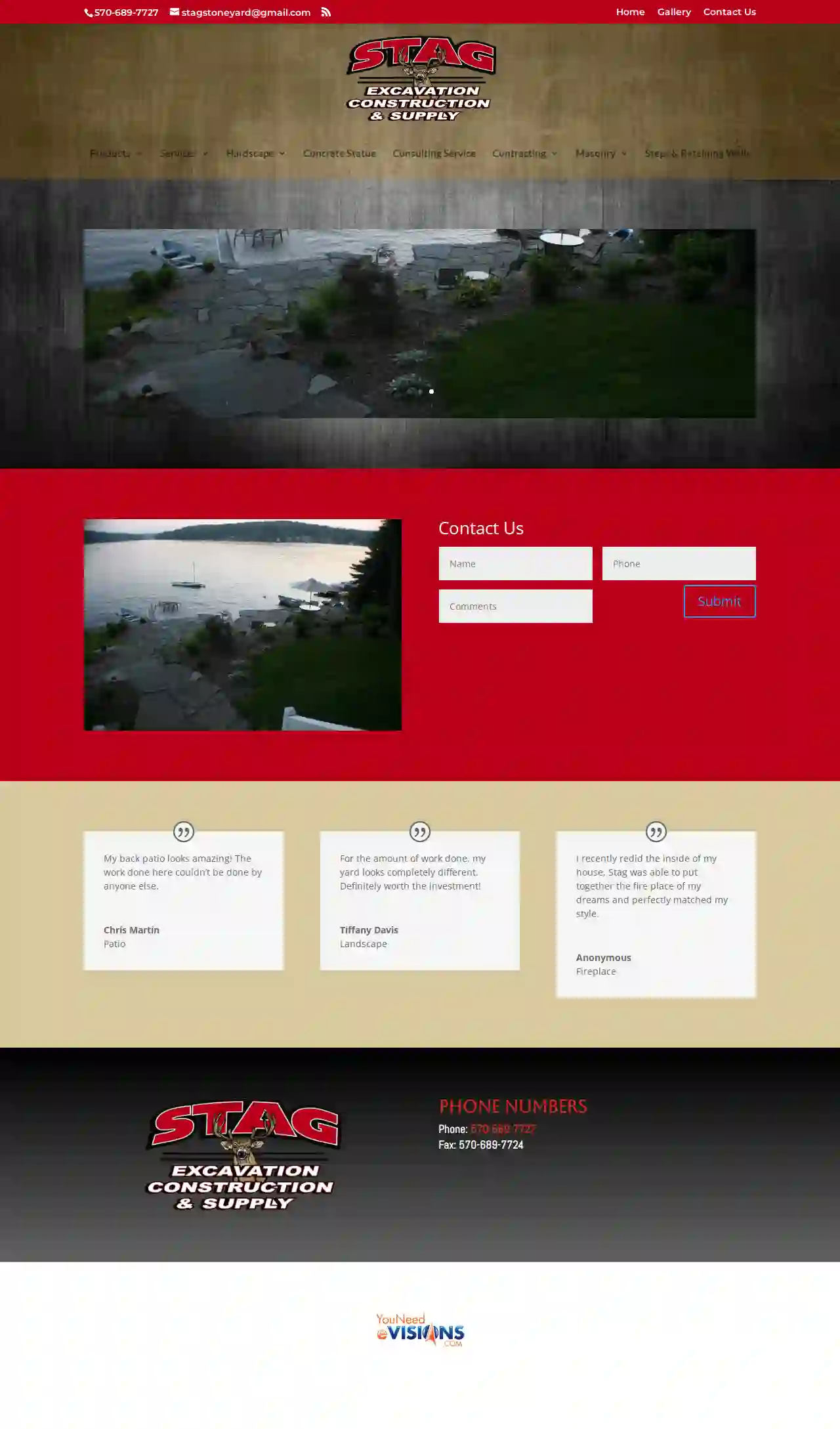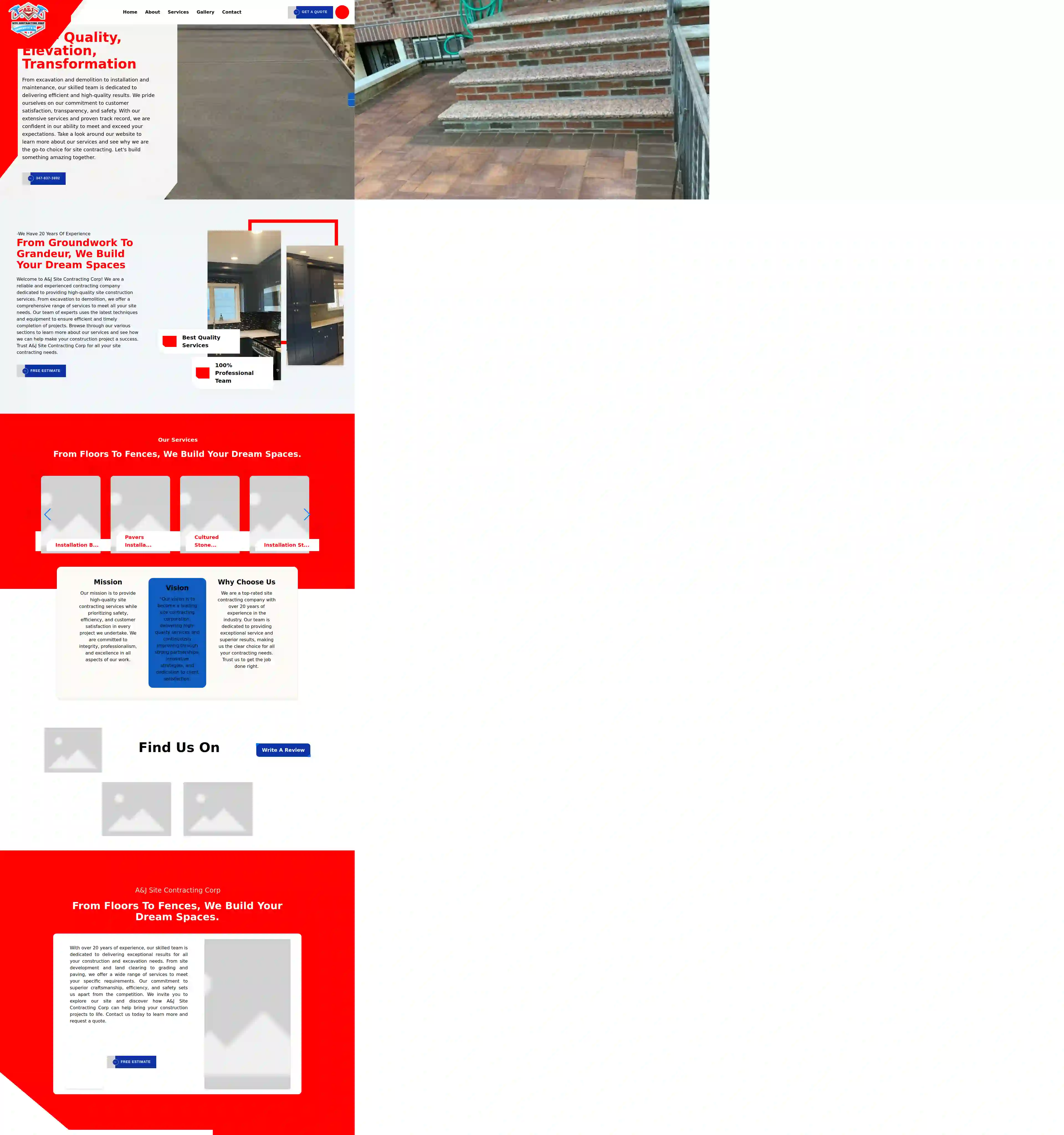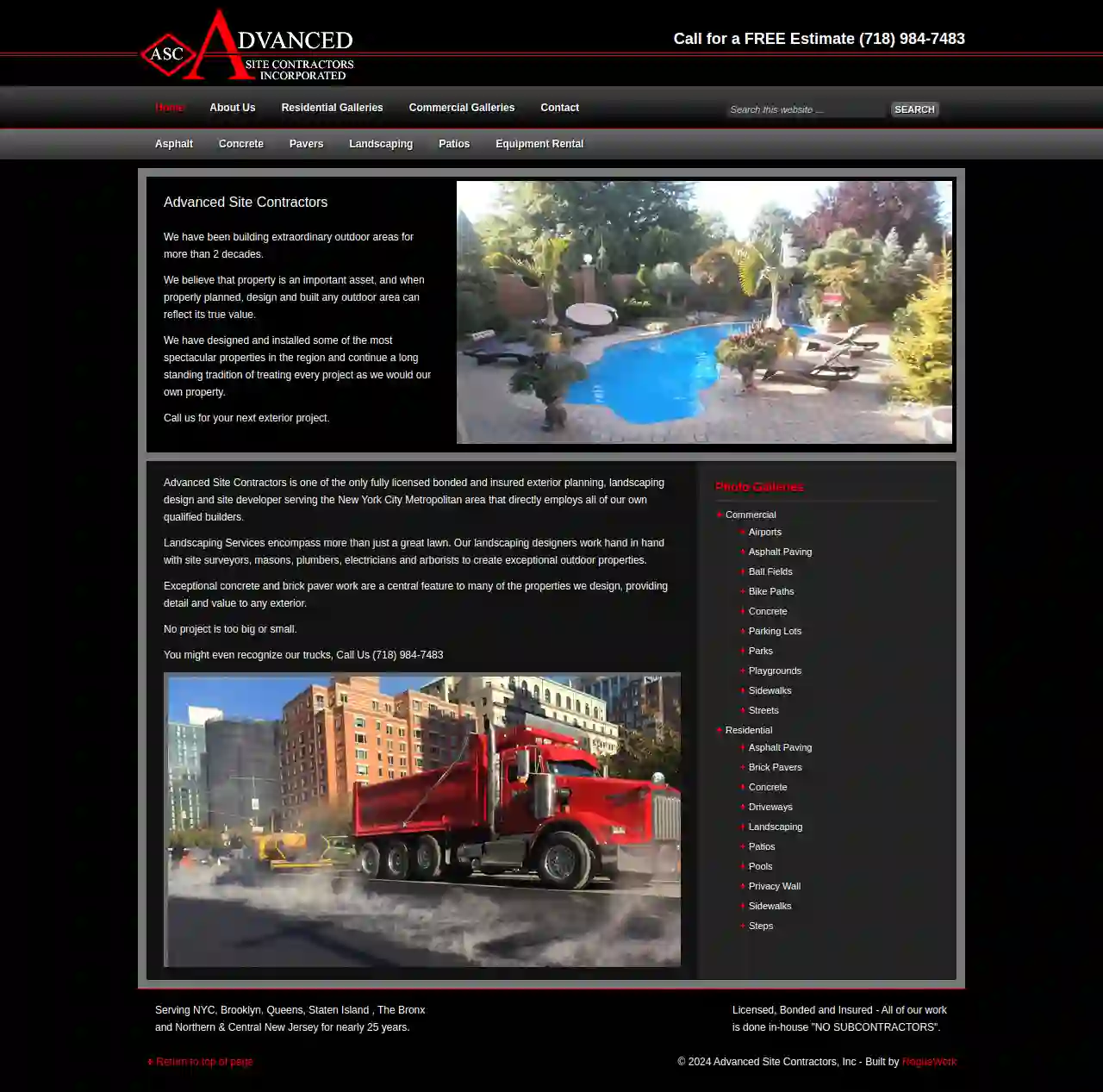Excavation Contractors Hellam
Find the best Excavation Companies in Hellam
Get 3 FREE Excavation Contractors quotes for your project today! Compare profiles, reviews, accreditations, portfolio, etc... and choose the best offer.

Stag Excavation Construction & Supply
52 reviewsHamlin, USStag Excavation & Stone Yard Stag Excavation & Stone Yard is a family-owned and operated business serving the Hamlin, PA area. We offer a wide range of services, from excavating and demolition to hardscaping and custom home construction. We are committed to providing our clients with high-quality workmanship and exceptional customer service. Our team of experienced professionals is dedicated to exceeding your expectations and delivering projects on time and within budget. We are proud to be a trusted name in the community and look forward to serving your needs. We are located just outside of Hamlin Corners in Hamlin PA. We offer free estimates on all of our services. Contact us today to schedule a consultation.
- Services
- Why Us?
- Testimonials
- Gallery
Get Quote
William Lawrence Excavating & Trucking
4.36 reviewsScranton, USAbout William Lawrence Excavating & Trucking William Lawrence Excavating and Trucking Company is a locally owned and operated business serving both residential and commercial clients in Montrose, PA for over 35 years. We take pride in our modern and well-maintained equipment, operated by a qualified, courteous, and reliable crew. Our commitment to safety is reflected in our fully insured operations. Whether you're planning a large or small project that requires excavating or trucking services, we offer free assistance in the planning stage and a free evaluation to help you find the most cost-effective methods available. We believe in delivering exceptional service and ensuring your project is completed to the highest standards. At William Lawrence Excavating & Trucking, we stand by our motto: "If We Start It…We Complete It!"
- Services
- Why Us?
- Gallery
Get Quote
Kizer Landscaping & Excavating
4.897 reviewsGreentown, USExperience the Difference Kizer Landscaping and Excavation No matter how big or small your landscaping job is, Kizer Landscaping & Excavating is here for you! We give you the best value, the best service, and you can depend on us to get the job done right. We are a locally owned and operated business based in Greentown, Pennsylvania. About Explore our Services Kizer Landscaping and Excavation We offer a variety of services, including landscaping, topsoil, stump removal, gravel driveway installation and repair, as well as many hardscaping services to enhance the look of your outdoor space and increase your home's value! Kizer Landscaping & Excavating also provides maintenance services for residential & commercial properties, on either a 7-day or 14-day cycle. Learn our History Kizer Landscaping and Excavating was founded in 2008 by Craig Kizer in Pike County. At age 8, Craig mowed his first lawn, and in the years that followed he developed a greater attention to detail for both lawn care and landscaping work. Turning his love and passion for the outdoors into a career was a natural step for Craig, seen today in the value and quality of his company’s work. Meet Craig and His Team >
- Services
- Why Us?
- Testimonials
- Gallery
Get Quote
Skiles Excavating, Inc.
46 reviews71 Smith Road, Newville, 17241, USSkiles Excavating: A Legacy of Precision and Community Skiles Excavating began its journey like many other successful excavating companies—with a single individual, James Skiles, who brought with him over 20 years of equipment operating experience, a backhoe, and an ambitious dream. In 2006, he created a business that would not only shape a better life for his family but also excel in the excavation industry. Since then, we’ve made significant strides, building strong relationships with electrical contractors while undertaking excavating projects for underground utilities and concrete work. Our services quickly expanded to include plumbing excavation and small site projects, enabling us to diversify our expertise. In 2018, we achieved the milestone of incorporation in Pennsylvania and are now proud to have a dedicated team of over 30 skilled employees. Our commitment to excellence and solid partnerships with contractors are the cornerstones of our success. One of our core values at Skiles Excavating is "Giving Back to the Community"— 1st Annual Shippensburg Pumpkin Festival
- Services
- Why Us?
- Gallery
Get Quote
CAG Construction Corp.
30 Summit Ave., Staten Island, 10306, USCAG Construction: Your Trusted Partner for Concrete Construction and Site Work CAG Construction is a family-run business established in 2007, specializing in all phases of concrete construction and site work. We are committed to delivering projects within budget, on time, and with the utmost professionalism. Our team has the experience and expertise to work seamlessly with project managers and design teams, ensuring a smooth construction process. Our Commitment to Excellence Edward Gonzalez, our founder, is a graduate of the NYC Small Business Services Construction Mentorship Program, NYC SBS Bond Readiness Program, and the New York City Economic Development Corporation – Construct NYC Program. This comprehensive training has equipped us with the knowledge and skills to deliver exceptional results. Certifications and Accreditations We are proud to be a New York City MBE Certified company, demonstrating our commitment to diversity and inclusion. We are also SCA Approved and a member of the National Association of Minority Contractors (NAMC), further solidifying our dedication to industry standards and ethical practices.
- Services
- Why Us?
- Gallery
Get Quote
Strouse Excavating and Landscaping
56 reviewsHarrisburg, USRF Strouse Landscape Excavate: Your Trusted Partner for Excavation, Landscaping, and Winter Services in Mount Wolf, PA We pride ourselves on providing exceptional services to residential and commercial clients throughout Mount Wolf, PA. With a commitment to quality, safety, and customer satisfaction, we offer a comprehensive range of services to meet all your property maintenance and improvement needs. From expert excavation to stunning landscape design and reliable winter services, we are your go-to solution for transforming and maintaining your outdoor spaces.
- Services
- Why Us?
- Gallery
Get Quote
A&J Site Contracting Corp
57 reviewsYork, USA&J - Quality, Elevation, Transformation From excavation and demolition to installation and maintenance, our skilled team is dedicated to delivering efficient and high-quality results. We pride ourselves on our commitment to customer satisfaction, transparency, and safety. With our extensive services and proven track record, we are confident in our ability to meet and exceed your expectations. Take a look around our website to learn more about our services and see why we are the go-to choice for site contracting. Let's build something amazing together. -we have 20 years of experience From groundwork to grandeur, we build your dream spaces Welcome to A&J Site Contracting Corp! We are a reliable and experienced contracting company dedicated to providing high-quality site construction services. From excavation to demolition, we offer a comprehensive range of services to meet all your site needs. Our team of experts uses the latest techniques and equipment to ensure efficient and timely completion of projects. Browse through our various sections to learn more about our services and see how we can help make your construction project a success. Trust A&J Site Contracting Corp for all your site contracting needs.
- Services
- Why Us?
- Our Team
- Gallery
Get Quote
Superior Earth Works, LLC
51 reviewsBel Air, Maryland, USIntroducing Superior Earth Works, LLC Transforming project visions into reality is our specialty at Superior Earth Works. Based in Bel Air, MD, we dedicate ourselves to providing top-quality excavation and concrete services for residential and commercial clients. Our goal is to achieve excellence in every project. By understanding our clients' needs and delivering beyond their expectations, we ensure that each project stands as a testament to superior craftsmanship and dedication. We believe that quality workmanship is the cornerstone of our business, and we strive to maintain the highest standards in every project, along with timely delivery and reasonable prices. As an experienced excavation contractor, we specialize in site clearing, ensuring that your land is ready for any new construction. Our demolition services are efficient and thorough, making way for new possibilities. With our bobcat services, we handle everything from land grading to site preparation with precision and care. Our expertise includes shoring services, providing the necessary support to safeguard your construction projects. Whether you require land demolition, grading, regrading, or resloping services, we have the skills and equipment to execute the job to perfection. We deliver impeccable building site preparation and construction site preparation. In addition to our excavation capabilities, we offer a full suite of concrete services. From driveways to patios, we deliver concrete work that enhances the utility and visual appeal of your property. Our concrete services are designed to withstand the test of time, providing durable and attractive surfaces that you can rely on. Choosing Superior Earth Works means choosing an excavation partner who values your project and strives to achieve superior results. Experience the difference that our dedication to excellence can make -- contact us today to discuss your excavation needs. Superior Earth Works in Bel Air, MD, is here to provide you with the superior service you deserve.
- Services
- Why Us?
- Gallery
Get Quote
Big Rock Excavations
57 reviews409 NORTH ROAD, STROUDSBURG, PA, USABOUT US Whether you’re developing a new piece of land or undertaking a demolition to make room for a new building, our extensive fleet of excavation equipment allows us to complete your excavation on time and on budget, without having to call more than one sub-contractor. As a modern, innovation-driven company, we work to incorporate the latest techniques and equipment to provide our clients the highest value for their time and money. With a focus on client satisfaction, our company only incorporates an in-house team that is trained with the most modern equipment and digging techniques. WHY WORK WITH US? Our friendly site inspectors will provide a thorough analysis and inspection of your site to help you understand the unique needs of your project. We will always uphold our promise of superior communication and provide upfront, detailed pricing for each and every part of the excavation process. Hundreds of satisfied customers have hired us for concrete cutting, concrete repairs, road repairs, demolition and more. Our clients include some of the largest and most-respected names in construction, many of which have awarded us prime contractor status and master service agreements. TRANSPARENT PRICING With the strength of our expert teams and upgraded equipment, you can outsource your entire excavation process with confidence. We are driven by the business principles of value creation and client satisfaction and tirelessly work to safely carry out all our processes without disrupting any surrounding property. EXPERTISE All our team members have decades-long experience in the excavation industry and have proven capabilities of getting the job done perfectly. By continually learning about the advancements in excavation techniques, we provide the most timely and cost-conscious experience to our clients.
- Services
- Why Us?
- Gallery
Get Quote
Advanced Site Contractors
4.714 reviewsYork, USAdvanced Site Contractors We have been building extraordinary outdoor areas for more than 2 decades. We believe that property is an important asset, and when properly planned, design and built any outdoor area can reflect its true value. We have designed and installed some of the most spectacular properties in the region and continue a long standing tradition of treating every project as we would our own property. Call us for your next exterior project. Advanced Site Contractors is one of the only fully licensed bonded and insured exterior planning, landscaping design and site developer serving the New York City Metropolitan area that directly employs all of our own qualified builders. Landscaping Services encompass more than just a great lawn. Our landscaping designers work hand in hand with site surveyors, masons, plumbers, electricians and arborists to create exceptional outdoor properties. Exceptional concrete and brick paver work are a central feature to many of the properties we design, providing detail and value to any exterior. No project is too big or small. You might even recognize our trucks, Call Us (718) 984-7483
- Services
- Why Us?
- Gallery
Get Quote
Over 22,076+ Excavation Contractors onboarded
Our excavation pros operate in Hellam & beyond!
ExcavationHQ has curated and vetted the Best Excavation Contractors near Hellam. Find the most trustworthy business today.
Frequently Asked Questions About Excavation Contractors
- Excavations Deeper Than a Certain Depth: This varies by jurisdiction, usually around 5 feet.
- Excavations Near Utilities: Digging near buried utilities (gas, water, electric) often requires permits and utility locates to prevent damage.
- Excavations Affecting Public Property: Projects impacting sidewalks, roads, or other public areas typically require permits.
- Excavations in Environmentally Sensitive Areas: Projects in wetlands, floodplains, or other sensitive areas might need special permits.
- Clearly Define the Scope: Outline the project's goals, including the excavation area, depth, grade, and intended use.
- Obtain Necessary Permits: Research and acquire any required permits from your local authorities.
- Mark Utility Lines: Contact your utility companies to locate and mark underground utilities to prevent damage.
- Communicate with Neighbors: Inform your neighbors about the project's timeline and potential noise or disruptions.
- Prepare the Site: Clear any obstacles, such as vegetation, furniture, or structures, from the excavation area.
- Discuss Safety Protocols: Review safety procedures with the contractor to ensure a safe work environment.
- Sloped Property: Your property has a significant slope, making it prone to soil erosion or landslides.
- Creating Usable Space: You want to level off a sloped area to create a flat surface for patios, gardens, or other outdoor spaces.
- Preventing Damage: Erosion is threatening existing structures, driveways, or walkways.
- Landscaping Features: You're incorporating tiered gardens, raised beds, or other landscaping elements requiring soil retention.
Do I need a permit for excavation?
What should I do before excavation starts?
What is the difference between cut and fill excavation?
Cut: Involves excavating soil from an area where the existing grade is higher than the desired grade.
Fill: Refers to using the excavated soil ('cut' material) to raise the grade in an area where the existing grade is lower than desired.
This method minimizes the need to import or export soil, reducing costs and environmental impact. It's commonly used for site preparation, road construction, and landscaping.
How do I know if I need a retaining wall?
Do I need a permit for excavation?
- Excavations Deeper Than a Certain Depth: This varies by jurisdiction, usually around 5 feet.
- Excavations Near Utilities: Digging near buried utilities (gas, water, electric) often requires permits and utility locates to prevent damage.
- Excavations Affecting Public Property: Projects impacting sidewalks, roads, or other public areas typically require permits.
- Excavations in Environmentally Sensitive Areas: Projects in wetlands, floodplains, or other sensitive areas might need special permits.
What should I do before excavation starts?
- Clearly Define the Scope: Outline the project's goals, including the excavation area, depth, grade, and intended use.
- Obtain Necessary Permits: Research and acquire any required permits from your local authorities.
- Mark Utility Lines: Contact your utility companies to locate and mark underground utilities to prevent damage.
- Communicate with Neighbors: Inform your neighbors about the project's timeline and potential noise or disruptions.
- Prepare the Site: Clear any obstacles, such as vegetation, furniture, or structures, from the excavation area.
- Discuss Safety Protocols: Review safety procedures with the contractor to ensure a safe work environment.
What is the difference between cut and fill excavation?
Cut: Involves excavating soil from an area where the existing grade is higher than the desired grade.
Fill: Refers to using the excavated soil ('cut' material) to raise the grade in an area where the existing grade is lower than desired.
This method minimizes the need to import or export soil, reducing costs and environmental impact. It's commonly used for site preparation, road construction, and landscaping.
How do I know if I need a retaining wall?
- Sloped Property: Your property has a significant slope, making it prone to soil erosion or landslides.
- Creating Usable Space: You want to level off a sloped area to create a flat surface for patios, gardens, or other outdoor spaces.
- Preventing Damage: Erosion is threatening existing structures, driveways, or walkways.
- Landscaping Features: You're incorporating tiered gardens, raised beds, or other landscaping elements requiring soil retention.